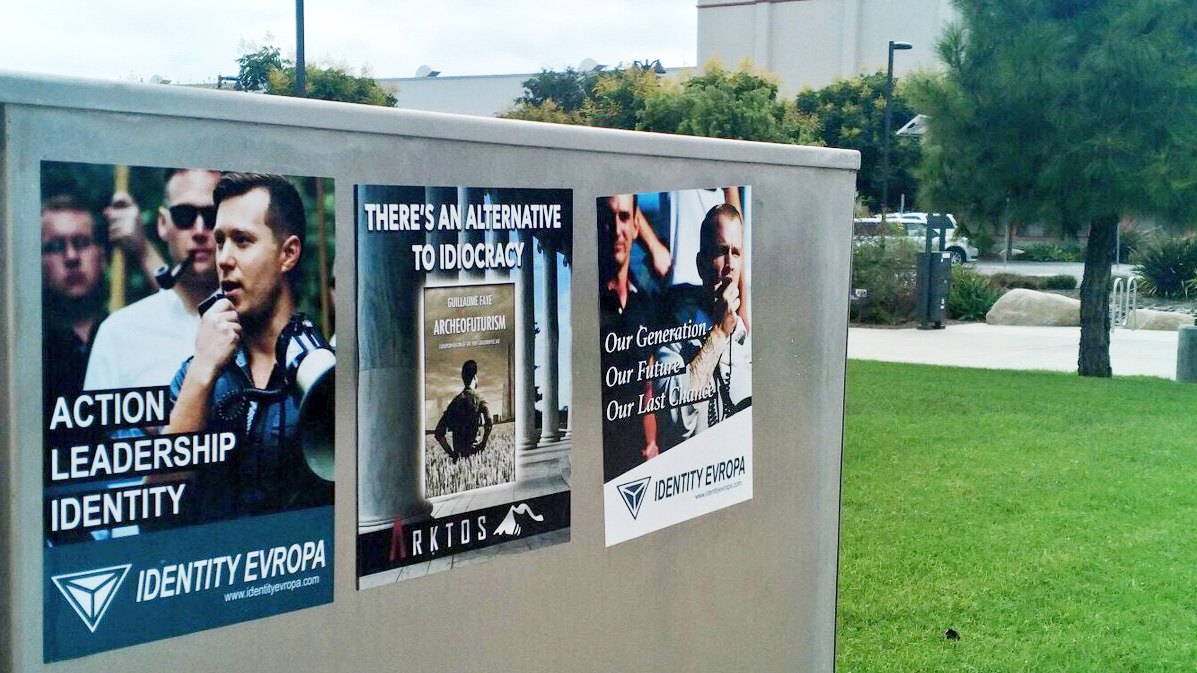As college campuses across the nation settle into the fall semester, many are being confronted by the realities of white supremacy.
Identity Evropa, a self-described “generation of awakened Europeans” who peddle the delusion of white genocide, has reinvigorated their college recruitment efforts. To do so they’ve enlisted the help of Aktos Media, a Europe-based publishing house with close ties to Richard Spencer’s altright.com.
Officially established in 2016, Identity Evropa was created by Nathan Damigo, a former Marine enrolled at the California State University, Stanislaus. A close associate of outspoken white nationalist, Richard Spencer, Damigo’s focus has remained largely on packaging his racist message as intellectualized identity politics. However, unlike the relative fluidity with which Spencer addresses his supporters and opponents alike, Damigo relies more heavily on his “fashy haircut,” flared nostrils and furrowed brow to convey his political message, or lack thereof.
Despite Damigo’s position as founder and CEO of Identity Evropa, he recently announced his resignation on August 27, 2017. His successor, Elliot Kline, aka Eli Mosley, reportedly joined the movement “because of the level of professionalism, intelligence and discipline displayed by its members.” Under Mosley/Kline, college campus recruitment has experienced a significant resurgence. Identity Evropa’s efforts to recruit young white college students have coalesced as #ProjectSiege.
Initially introduced on September 27, 2016 in a YouTube video featuring Damigo, #ProjectSiege aims to challenge the “false anti-white narrative” that he claims has been advanced in academia. Throughout 2016, the organization posted flyers on college campuses in an estimated 41 separate instances. However, with the spring 2017 semester, #ProjectSiege experienced a resurgence in flyering, concentrated primarily in February. The current fall semester has also seen an uptick in #ProjectSiege actions, with 26 flyering incidents thus far in September alone and an estimated 95 in all of 2017.
While #ProjectSiege’s recent rejuvenation could be attributed to the change in leadership, a new publishing partnership may also play a key role. On September 7 Identity Evropa announced via Twitter that it had teamed up with Arktos Media “to promote identitarian literature with university students.”
The new partnership is far from unpredictable for many reasons. Beginning with the history of Arktos Media, the publishing house was first established in 2009 as a collaborative effort between several identitarian publishing personalities. The inception of Arktos is a bit murky, with reports that it began in India in 2010 as a joint venture between Swedish businessman, Daniel Friberg and John B. Morgan, the American editor-in-chief of Integral Tradition Publishing Ltd. However, in an interview published on altright.com, Friberg adamantly claims that Arktos was solely the brainchild of Scandinavians. Only after the idea initially came to fruition in Aarhus, Denmark, in 2009 did Arktos move to Mumbai, India, as two of the Nordic collaborators had started the aforementioned publishing company with John B. Morgan. Upon the relocation, Arktos absorbed Tradition Publishing, and in doing so, appointed Morgan as the editor-in-chief.
In its infancy, Arktos Media allegedly began an aggressive campaign to establish itself as the arbiter of European New Right literature. According to Friberg, they developed an investment strategy in which they “acquired the rights to the most important books by Guillaume Faye and Alan de Benoist.” However, after several years of operating out of Mumbai, Friberg had had enough of the “adventure [of] operating out of a Third World country,” and moved their “main operations back to [their] own civilization, Europe, in early 2014.”
While Friberg only vaguely refers to their relocation as returning to Europe, reports indicate that Arktos Media moved to Budapest. The location and timing of such a move is certainly no accident, as Hungary has been experiencing a resurgence in conservative politics based largely on the influx of Muslim refugees to Europe for several years. Prior to Arktos’ move, two right-wing parties, Fidesz and Jobbik gained significant prominence in the Hungarian parliament, thus aiding in the passage of a new, largely anti-democratic constitution. Around the time Arktos relocated, Budapest was roiled in conflict over Fidesz’s decisive parliamentary win in an unfair election, as well as Prime Minister Viktor Orban’s belief that liberal democracy was archaic. More recently, in May 2017, the European Parliament has taken issue with the Hungarian government’s efforts to close the liberal Central European University in Budapest. Thus, the atmosphere in Hungary has become a bastion of white supremacy, and has served as an inspiration to groups such as Identity Evropa.
Throughout this time period, Arktos began to stretch its legs as one of the foremost publishers of identitarian literature. In addition to Faye and Benoist, both of whom are far right French thinkers who support variations of Samuel Huntington’s Clash of Civilizations, Arktos has issued translations and original texts from numerous conservative figures. Amongst the most notable are Russian geopolitical author Alexander Dugin, who was a vocal supporter of Russia’s annexation of Crimea; Professor Paul Gottfried, arguably one of the architects of the alt-right and founder of the right-wing academic H.L. Mencken Club; and Julius Evola, an Italian fascist who inspired such figures as Benito Mussolini, Heinrich Himmler and Steve Bannon. In all, the publishers project that they will have put out 180 texts by the end of 2017.
As the number of publications and translations grew, so too did Arktos’ professional affiliations. In October 2016, Morgan was replaced by Jason Reza Jorjani as editor-in-chief. Jorjani, an Iranian-American with a PhD in philosophy and teaching career at the New Jersey Institute of Technology, gained alt-right notoriety due in large part to the success of his book, Prometheus and Atlas. A June 2016 interview on Red Ice Radio accelerated his rise amongst the alt-right media syndicate. Red Ice has been providing online “news” from a Euro-centric standpoint since 2003. Some of its staying power can be attributed to founder, Henrik Palmgren’s Swedish origins, as much of the identitarian movement surpasses exaltation and borders on the fetishization of Scandinavian heritage. Jorjani’s interview was well received by viewers and undoubtedly played a role in garnering his new position at Arktos Media.
Jorjani’s vision for the future of Arktos was one of ambitious expansion, albeit too much expansion. In November 2016, Jorjani met Richard Spencer and quickly formed a bond based on a shared interest in the “total integration of the European New Right and the North American alt-right.” Their similar aspirations were made evident in a speech Jorjani gave at the National Policy Institute in which he labeled the alt-right as “the decisive factor” in the election of Donald Trump, thus setting the stage for an alt-right media conglomerate. The pair subsequently bought the altright.com domain name and Spencer launched the website on January 16, 2017. Altright.com, Arktos Media and Red Ice Radio substantiated their ideological and professional ties under the AltRight Corporation with significant overlap between the altright.com masthead and Arktos Media staff. Notable figures include Daniel Friberg, acting as altright.com’s European editor and Artkos’ CEO; Tor Westman as altright.com’s technical director and Arktos’ chief marketing officer; Henrik Palmgren of Red Ice Radio as media director for altright.com; and Jorjani as a fomer altright.com board member and former editor-in-chief of Arktos Media.
However, as self-aggrandizement is intrinsic to the radical right, commensurate collaboration is difficult, if not impossible. Thus, as is to be expected, egos and diverging interests plagued the AltRight Corporation from the inception of altright.com to Jorjani’s resignation on August 15. In the same aforementioned November 2016 speech, Jorjani spoke of his envisioned future for Arktos as the vanguard of the “Indo-European tradition.” His affirmation that the Aryan populations of Europe, Greater Iran, Hindu India and the Buddhist East were the sources of all great human creations remained his guiding principle throughout his time at Arktos, which did not sit well with the AltRight Corporation’s puppet masters.
Jorjani was further criticized following the publication of an op-ed in The New York Times in which a Swedish graduate student went undercover to infiltrate the alt-right. In a recorded conversation, Jorjani predicts the expulsion of Muslim migrants and citizens alike to create a dystopian 2050 Europe where “the bank notes have Adolf Hitler, Napoleon Bonaparte, Alexander the Great. And Hitler will be seem like that: like Napoleon, like Alexander, not like some weird monster who is unique in his own category—no, he is just going to be seen as a great European leader.” He goes on to divulge his connections to the Trump administration via Steve Bannon, stating that his initial hope was to “become like a policy group for the Trump administration.”
Both Jorjani and Spencer’s egotism were on full display in their hasty responses to the publication of the New York Times article. In his September 20th post, Jorjani asserted that he was the “real brain installed at the pinnacle of the [AltRight Corporation] hierarchy.” However, he had chosen to step away from that alleged role due to his increasing involvement with the Iranian Renaissance movement. In addition, he sought to clarify how his Iranian Renaissance associates “facilitated some initially promising private meetings with the incoming Trump Administration policy makers” to discuss shared interests in “an inclusively identitarian Indo-European Community [that] would be strong enough to take on China and Islam in the battle for planetary hegemony.” Nevermind the obvious issue of equating a nation and a religion under the moniker of common enemy, Jorjani’s continuous claims of Trump administration affiliates are alarming given the administration’s inability to unequivocally denounce white supremacists. He then goes on to assert that revealing the identities of his mystery investors, whose contributions never materialized, “would catalyze for a mainstream media scandal.”
In his response the next day, Spencer ridiculed Jorjani for speaking so openly, yet vaguely about his supposed Trump connections in addition to his unfruitful promises of mysterious funding. However, Spencer’s sharpest criticism targeted the series of events that culminated in Jorjani’s resignation from the AltRight Corporation. Following the events in Charlottesville, Virginia on August 12, Jorjani was given an ultimatum to either “leave the Alt-Right or leave the Iranian resistance.” Given Jorjani’s devotion to the “long-term revitalization and liberation of Europe — linked to a future, post-Islamic Greater Iran via the Caucasus” he chose the former in favor of upholding ties to the latter.
In a not-so-subtle retort to Jorjani’s “preferred interest of a Middle Eastern country over a movement that represents the identities of White people in America and Europe,” altright.com published an article by Identity Evropa’s Mosley/Kline on the same day. In this quasi-motivational fluff piece Mosley/Kline describes Charlottesville as a watershed moment that separated the alt-right devotees from the “unnecessary baggage.” The piece then takes a cautionary tone in regards to leaving the movement that can only be read as a direct reference to Jorjani’s actions. He warns that, while they “all know that there’s no real quitting … the only acceptable way to back away is through silence.” Don’t provide any insight to the media or a synopsis on the causes of broken morale; simply fade away. However, while Mosley/Kline did conclude by encouraging participants to offer concerns and suggestions to the nascent movement, the takeaway from Jorjani’s experience can be to do so sparingly, as the commitment to a radical right agenda owes no responsibility to reason.
As evidenced by Spencer’s participation in an Identity Evropa protest on Saturday, the group’s partnership with Arktos Media and the larger AltRight Corporation was couched in predictability. As their backs were already firmly against the wall of extremism, there was no room for negotiating the stances of those at the helm of the Corporation. Jorjani’s more expansive — yet still undoubtedly white supremacist — view of the Aryan identity proved too similar to the globalist agenda that the alt-right seeks to mitigate. Thus, he was relinquished back to the liberal halls of academia while Identity Evropa rose in rank amongst the alt-right publishing syndicate. The #ProjectSiege partnership could prove to be symbiotic by reaffirming Arktos Media’s commitment to European identitarianism, as well as establishing Identity Evropa’s place amongst the most “fashy” of the alt-right, if they stick to the agenda.






